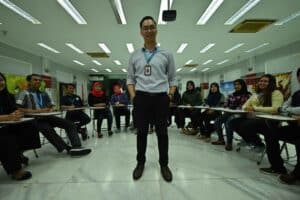When Vincent Yo first returned to Indonesia in 2003, he was asked to join the family business. Yo’s father was the founder of PT Leading Garment Industries, and he planned to retire. Now, they wanted Vincent to take over the key leadership role. Having spent most of his education overseas, Yo was reluctant with the ambitious path he was being pressured to take, as the number one person in the company. He requested a three-year period to study how the company operated and asked for the chance to do the day-to-day work, just like the other staff. However, the circumstances only allowed him to do so for six months.
When Yo stepped into the top leadership role, he incorporated his learnings from the factory floor. One lesson that he felt was of chief importance was that the garment company paid little to no attention to training workers. He was determined to change this. Yo views the garment sector as not just labour-intensive, but also people-oriented. As such, he felt that the industry needed to train its people on soft skills, despite the increasing costs and return on investments (ROI) that some claim “does not always make sense.”
“But if we see that the investment in training is for your own people, yourself, and your group who need each other to be successful, I believe that the investment exceeds its ROI,” said Vincent, who is now the company’s managing director.
He added that soft skills trainings are also important for the larger workforce, as he believes that many Indonesians lack management and leadership skills. Yo is not an exception in thinking this. According to a 2021 Indonesian Employers Association (Apindo) survey in collaboration with International Labour Organization (ILO), most management representatives found it difficult to find workers with skills such as interpersonal communication, problem-solving, team work, emotional intelligence and leadership acumen.
Yo’s passion for training led him to choose Better Work Indonesia Supervisory Skills Training (SST) program in 2014. He learned SST has trained hundreds of factory supervisors and supervisor candidates to acquire professional leading skills, which has led to significant productivity increases in the factories. This matched with the needs of his factory.
A survey on SST’s impact between 2016 and 2017 showed that SST decreased the turnover rate for lines whose supervisors participated in SST, as well as leading to better levels of worker satisfaction and productivity. Beni Rahmat, the factory manager of the company, said SST has resulted in a 3 per cent decrease in their turnover and an increase in general compliance, leading to fewer work-related accidents.
Work atmospheres at PT Leading Garment Industries have also improved, and the relationship between supervisors and the workers in their lines has become more connected, Rahmat added. “Most employees are happy about the training, they consider it as an intermezzo to their day-to -day work schedule,” he said.
Following in Better Work’s footsteps, PT Leading Garment Industries started a training center in 2017 that trains employees in both technical skills – such as line balancing – and soft skills that include self-leadership, stress management, supervisory skills, and communication.
The garment factory derives its soft skill programs from Better Work Indonesia’s SST modules. Alongside another colleague, Training Manager Edgar Sulistyo Gunawan teaches the participants, employees who are in the pipeline for leaderships positions, in a two-day class. In 2019, around 40 of these employees joined self-leadership training, half of them undertook the stress management class, and a quarter of them learned supervisory and communication skills, Gunawan said. Not only that, through their internal radio channel, the factory broadcasts various content related to self-motivation and leaderships. The modules that targeted a wider employee base in the factory are set to 10 minutes each and scheduled to air prior to and during lunch time.

Soft skills, like leadership skills and communication, are now considered “musts” in the industry, if workers desire to move up the management ladder. Researchers found that 173 out of 180 respondents, or 98 percent, stated that their company needs both technical skills and soft skills for managers and supervisors to perform their roles effectively.
“What makes me satisfied about my job is that I see the change that happens [after the training],” said Gunawan, recounting how one employee who only graduated from primary school will soon become a supervisor, thanks to her desire to learn.
But training workers has not always been easy. Gunawan said conflicting schedules complicate training arrangements. Before establishing a training center, Yo also said he faced hurdles in finding the right people to run the training center, while previous teachers had experienced burnout, as they worked on the weekends to train others.
As he tackles these challenges, Vincent Yo strives to achieve his dream of making the training as holistic as possible. He plans to add training sessions on living a healthy life, managing personal finance, and building motivation and character, among a slew of other ongoing training ambitions.
“Maybe these people will not work at PT Leading one day. But once these people leave PT Leading, they will look back and see that the things that they got here are meaningful for the rest of their life,” said Yo.